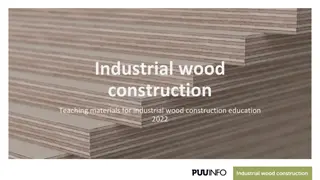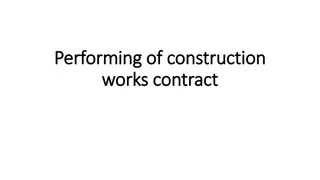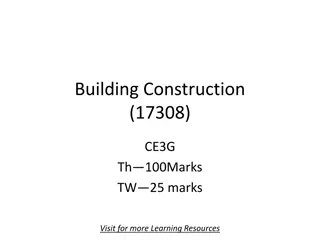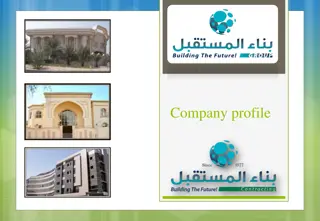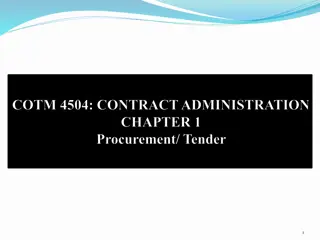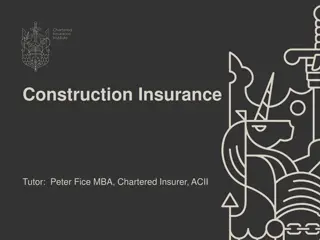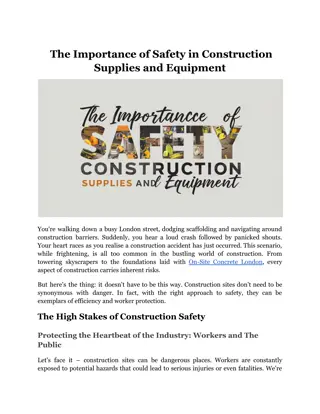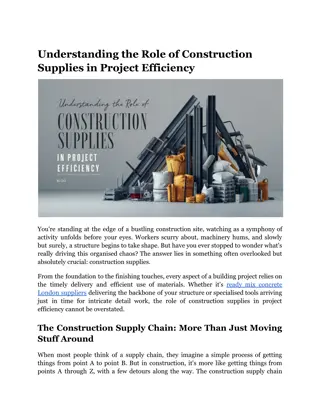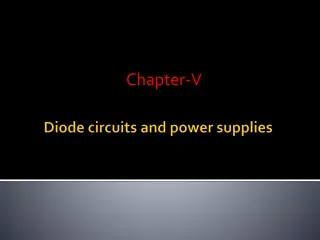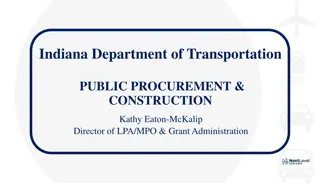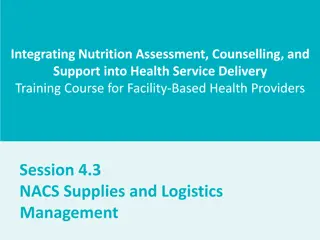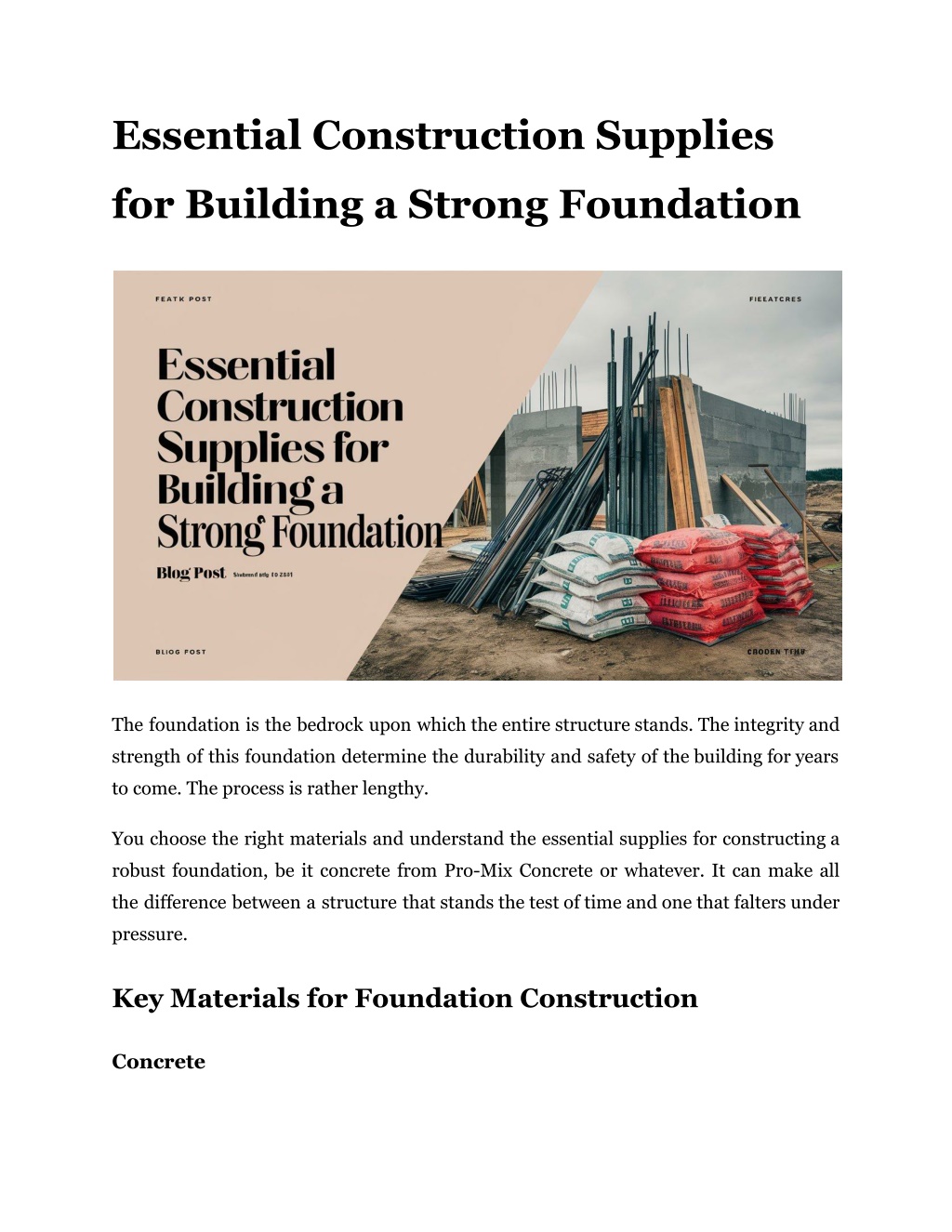
Essential Construction Supplies for Building a Strong Foundation
Discover key supplies every builder needs to create a strong, lasting foundation for any construction project.
Download Presentation

Please find below an Image/Link to download the presentation.
The content on the website is provided AS IS for your information and personal use only. It may not be sold, licensed, or shared on other websites without obtaining consent from the author. Download presentation by click this link. If you encounter any issues during the download, it is possible that the publisher has removed the file from their server.
E N D
Presentation Transcript
Essential Construction Supplies for Building a Strong Foundation The foundation is the bedrock upon which the entire structure stands. The integrity and strength of this foundation determine the durability and safety of the building for years to come. The process is rather lengthy. You choose the right materials and understand the essential supplies for constructing a robust foundation, be it concrete from Pro-Mix Concrete or whatever. It can make all the difference between a structure that stands the test of time and one that falters under pressure. Key Materials for Foundation Construction Concrete
Concrete is the most widely used material for foundations due to its strength, durability, and versatility. It is composed of cement, water, sand, and aggregates (gravel or crushed stone). Advantages Disadvantages High compressive strength Can crack under extreme conditions Durable and long-lasting Requires proper curing to achieve maximum strength Resistant to fire and weathering Read More Articles: Best Ingredients in Root Lifter Sprays for Long-Lasting Lift Choosing High-Strength Concrete When considering high-strength concrete for your foundation, C35 concrete is an excellent choice. This type of concrete is commonly supplied by specialised c35 concrete suppliers who provide the right mix for specific construction needs. Reliable c35 concrete suppliers can make a significant difference in the quality and durability of the foundation. Look for suppliers who provide detailed information on the mix and promise timely delivery. Reinforced Concrete Reinforced concrete incorporates steel bars (rebar) or mesh to enhance tensile strength, making it suitable for various loads and stresses. Advantages Disadvantages Increased strength and stability Higher cost compared to regular concrete Better performance in seismic zones Requires skilled labor for installation
Versatile for different architectural designs Steel Steel is often used in conjunction with concrete for reinforcement or as a primary material in deep foundations (e.g., piles). Advantages Disadvantages High strength-to-weight ratio Susceptible to corrosion if not properly treated Flexibility in design Higher alternatives material costs compared to Resistant to various environmental factors Stone Stone foundations are durable and have been used for centuries. They are often chosen for their aesthetic appeal and longevity. Advantages Disadvantages Extremely durable Labor-intensive to install Natural weathering resistance to Higher cost and not suitable for all soil types Aesthetic appeal Brick Brick foundations provide good compressive strength and have a classic appearance, although they are less common today. Advantages Disadvantages
Aesthetic appeal Prone to water damage if not properly sealed Fire-resistant properties Requires skilled labor for installation Wood Wood foundations are typically used in low-load structures or in areas where wood is readily available and cost-effective. Advantages Disadvantages Lightweight and easy to work with Prone to rot and insect damage Cost-effective structures for temporary Not suitable for heavy loads or permanent foundations Foundation Types Slab Foundations Slab foundations consist of a single layer of concrete poured directly onto the ground. They are cost-effective and quick to install, making them popular in warmer climates. Crawl Space Foundations Crawl space foundations elevate the building slightly above ground level, allowing for ventilation and easy access to plumbing. Basement Foundations Basement foundations create additional living space below ground level. They consist of walls that extend below the frost line. Some considerations for each type of foundation: Foundation Type Considerations
Slab Foundations Requires proper insulation in colder climates to prevent frost heave. Crawl Foundations Space Useful in areas with high water tables, but can be prone to moisture issues. Basement Foundations Require infiltration. effective waterproofing to prevent moisture Essential Equipment for Foundation Construction Excavation Equipment Proper excavation is crucial for foundation preparation. Common equipment includes: Backhoes Excavators Bulldozers Compaction Equipment Compaction equipment is used to ensure the soil around the foundation is stable and prevents settling. This includes: Vibratory rollers Plate compactors Tampers Formwork Formwork is necessary for shaping poured concrete foundations. It can be made from wood or metal, depending on the design and requirements. Read More Articles: Root Lifter Spray: The Secret to Fuller, Thicker Hair Considerations for Foundation Design
Soil Type Assess the load-bearing capacity and stability of the soil to determine the appropriate foundation type. This is crucial for preventing foundation failure and guaranteeing longevity. Load Requirements Evaluate the weight of the structure and any additional loads (e.g., snow, wind) to ensure the foundation can support them. Proper load assessment helps in selecting the right materials and design. Environmental Factors Consider factors like flooding, erosion, and seismic activity when designing the foundation. These factors can significantly affect the foundation's performance and durability. Water Table Understanding the depth of the water table is critical for preventing moisture-related issues. High water tables can lead to foundation instability and require special construction techniques. It All Comes Down To This Understand these differences and carefully consider factors like soil type, load requirements, and environmental conditions. Make informed decisions that will benefit your project in the long run. From the versatility of concrete and the strength of reinforced steel to the timeless appeal of stone and brick, each foundation material offers unique advantages. The choices you make when it comes to foundation construction can have a lasting impact on the stability and safety of your structure. Prioritise the right construction
supplies like Pro-Mix Concrete and follow best practices. This way, you can lay the groundwork for a building that will stand strong for years to come. Site Article: Essential Construction Supplies for Building a Strong Foundation




